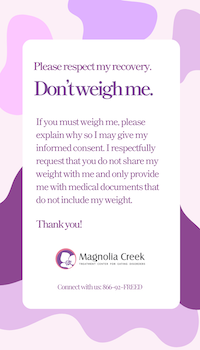magnolia creek
Empowering Students in Eating Disorder Recovery
Eating disorders can affect anyone, but adolescents, teens, and young adults face a uniquely high risk.

Specialized eating disorder treatment for students
High school and college students facing eating disorders need support and resources to navigate recovery. Academic pressure, social influences, and underlying mental health conditions can contribute to these illnesses, affecting family life, mental well-being, and academics.
Magnolia Creek understands these challenges and provides compassionate, specialized treatment tailored to each student’s needs. No matter where they are in their journey, we help them find a path to lasting recovery.
Key Signs + Symptoms of Eating Disorders
Early detection of an eating disorder dramatically improves the chances of recovery, making it essential to recognize the warning signs. While not everyone will display all symptoms — and they can vary between disorders — the list below serves as a general guide to help identify potential concerns. Understanding these behaviors is the first step in seeking the right support for recovery.
Emotional + behavioral signs
- Preoccupation with weight, food, calories, + dieting
- Intense concern about body size + shape
- Withdrawal from social activities + relationships
- Increased secrecy + isolation
- Frequently mirror-checking for perceived flaws
- Extreme mood swings
- Avoiding mealtimes or food-related situations
Physical signs + symptoms
- Noticeable fluctuations in weight
- Difficulty concentrating
- Constantly feeling cold
- Dizziness, especially when standing
- Sleep disturbances
- Dry skin, hair, + brittle nails
- Muscle weakness
- Weakened immune system
Root Causes of Eating Disorders in Students
While the exact cause of an eating disorder may be unclear, various triggers and factors can contribute to disordered eating behaviors.

1. Academic stress
Academic pressure, tight deadlines, and exam stress can elevate anxiety levels, leading some students to develop disordered eating patterns as a coping mechanism.

2. Body image concerns
Academic pressure, tight deadlines, and exam stress can elevate anxiety levels, leading some students to develop disordered eating patterns as a coping mechanism.

3. Transitions + life changes
Moving away from home, adjusting to a new environment, and managing newfound independence can be overwhelming, intensifying emotional struggles with food and body image.

4. Transitions + life changes
Moving away from home, adjusting to a new environment, and managing newfound independence can be overwhelming, intensifying emotional struggles with food and body image.

5. Perfectionism
The drive for perfection — whether in academics, extracurriculars, or appearance — can lead to rigid eating habits and a distorted body image.

6. Peer pressure
School social dynamics can influence eating behaviors, as peer pressure to conform to certain body ideals, follow dieting trends, or adopt group eating habits may contribute to disordered eating.

7. Cultural influences
Unrealistic body standards in media, dieting trends, and social media’s emphasis on appearance can influence students’ eating habits and body perception.
The Impact of Eating Disorders in College Students
Eating disorder risk among US college students rose 13% from 2013 to 2020-2021.
Only 22% of colleges offer year-round screenings for eating disorders, and just 45% provide screenings once per year or semester.
Only 20% of students who screened positive for an eating disorder reported receiving treatment.
Helping Students Find Their Way Forward
Explore the links below for expert guidance, tools, and treatment resources designed to support students facing eating disorders.
1. Don't Weigh Me
If knowing your weight is a trigger during recovery, you have the right to speak up and protect your progress, especially during medical visits.
Self-advocacy through assertive communication empowers you to:
- Communicate your triggers
- Set boundaries
- Stand up for yourself
- Ask for help
- Build + maintain healthy relationships
- Stay engaged in your recovery
Screenshot or print a “Don’t Weigh Me” card to advocate for yourself at your next medical appointment.
2. National Organizations
The National Alliance for Eating Disorders is the leading national nonprofit organization providing education, resources, and support for eating disorders.
The International Association of Eating Disorder Professionals (iaedp™) provides education, training, and certification for practitioners and professionals who treat all types of eating disorders.
The mission of the Academy for Eating Disorders is to advance eating disorder prevention, education, treatment, and research by expanding the global community of committed professionals.
3. Taking a Leave of Absence
Stepping away from school to seek treatment for an eating disorder can be scary, especially if you worry that time away will jeopardize your academic future.
While these fears are understandable, it’s also important to realize that eating disorders can be life-threatening, and they can gain a stronger hold on your mind and behaviors the longer they’re untreated.
By prioritizing treatment, even when that means taking a break from school, you’re investing in yourself, your future, and your overall well-being.
Understand school policies + your rights
Review your specific school’s policies on leave of absence and consult the administration.
Communicate with key individuals
Submit a formal request for a leave of absence.
Academic planning
- Notify your professors.
- Discuss options for withdrawing from courses or receiving incomplete grades.
- Seek advice and support from your academic advisor.
Focus on recovery
- Follow your treatment plan prescribed by your healthcare providers.
- Prioritize self-care activities that promote your physical and mental well-being.
Plan your return to school
- Work with your academic advisor to develop a reintegration plan, which may include a reduced course load or additional support services.
- Maintain any ongoing therapy or support group sessions to help you transition back to school while continuing your recovery.
faqs
For Students + Their Loved Ones
How can friends and family support a student struggling with an eating disorder?
Here are some ways friends and family can offer meaningful support to a student with an eating disorder:
- Listen without judgment – Offer empathy and patience, allowing them to express their feelings.
- Encourage open communication – Create a safe space for them to talk about their struggles and progress.
- Remind them recovery is a journey – Offer reassurance that healing takes time and setbacks are normal.
- Assist with stress management – Help with day-to-day stressors to alleviate emotional strain.
- Avoid commenting on food, weight, or appearance – Focus on their emotional well-being instead.
- Encourage professional support – Help them seek the necessary treatment and therapy.
- Provide consistent, loving support – Stay involved in their recovery process with care and compassion.
What steps can schools take to support students struggling with eating disorders?
Schools can take several steps to promote a supportive environment for students struggling with eating disorders:
- Education + awareness – Provide training for staff, faculty, and students on recognizing signs of eating disorders, promoting body positivity, and encouraging healthy relationships with food.
- Screening + early intervention – Offer regular, confidential screenings and mental health check-ins to identify at-risk students early.
- Accessible counseling + support services – Ensure students can access on-campus or partnered mental health professionals specializing in eating disorders.
- Accommodations for recovery – Develop academic flexibility for students undergoing treatment, such as adjusted schedules or meal support plans.
- Peer support + advocacy groups – Create student-led organizations focused on body acceptance, mental health, and eating disorder recovery.
- Mindful dining + nutrition support – Offer inclusive, dietitian-backed meal options and create a judgment-free dining environment.
- Address harmful norms – Discourage diet culture, weight-based stigma, and social pressures that contribute to disordered eating behaviors.
By implementing these steps, schools can create a safer, more understanding space for students navigating eating disorders.
What resources are available for students struggling with eating disorders?
Students struggling with eating disorders have access to a variety of resources designed to support their recovery:
- Campus counseling services – Many colleges offer free or low-cost counseling and therapy services to help students manage emotional struggles and mental health issues like eating disorders.
National Eating Disorders Association (NEDA) – NEDA offers a helpline, online resources, and a treatment finder tool to connect students with specialized care.
Eating disorder support groups – Peer support groups, both in-person and online, provide a space for students to connect with others going through similar experiences.
Medical professionals – Primary care physicians, psychiatrists, and dietitians can offer personalized care and treatment options that encompass both medical and nutritional support.
Hotlines – Resources like the National Eating Disorders Helpline (800.931.2237) provide confidential support and guidance.
These resources can be crucial in connecting students with the care they need on their recovery journey.
How can eating disorders impact a student's ability to attend and participate in school?
Eating disorders can significantly affect a student’s ability to succeed academically. Physical health issues, such as fatigue, dizziness, and nutritional deficiencies, can interfere with energy levels and overall well-being. Additionally, difficulties with concentration, memory, and decision-making can impair focus, hinder learning, and negatively impact academic performance.
The emotional and psychological toll of an eating disorder — including anxiety and depression — can further affect a student’s motivation, self-esteem, and ability to engage in classroom activities. Recognizing these challenges is essential in providing proper support for students.
Step into healing at your own pace.
Magnolia Creek offers two distinct levels of care — residential treatment and partial hospitalization — with a focus on tailoring each client’s treatment plan to their unique diagnosis and recovery goals.
More Resources

What Is ARFID? How It Differs from Other Eating Disorders

Teen Body Image: What Parents Need to Know

Navigating College with an Eating Disorder
Renew your hope at Magnolia Creek.
Contact us today or complete our form to connect with an admissions specialist who will guide you to the right program. Healing is just a call away.
Your privacy is our priority. All communication is completely confidential.














































